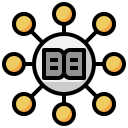Designing Inquiry with Encyclopedic Gateways
Begin with a short article excerpt and run a quick QFT routine: produce, improve, and prioritize questions. Students sort closed and open questions, then plan research moves. Share the top three student questions in your class forum and ask peers to suggest next steps.
Designing Inquiry with Encyclopedic Gateways
Transform KWL into KWI: What we Know, Want to investigate, and where to Investigate first. The encyclopedia offers reliable first stops, definitions, and context. Invite students to post their I-list links and reflect on which source clarified their thinking most effectively.
Designing Inquiry with Encyclopedic Gateways
Assign a concise overview as the anchor, then branch into specialized entries, primary sources, and datasets. Encourage concept mapping that visualizes connections. Ask students to submit screenshots of their maps and describe one surprising link they discovered during exploration.
Designing Inquiry with Encyclopedic Gateways
Lorem ipsum dolor sit amet, consectetur adipiscing elit. Ut elit tellus, luctus nec ullamcorper mattis, pulvinar dapibus leo.




